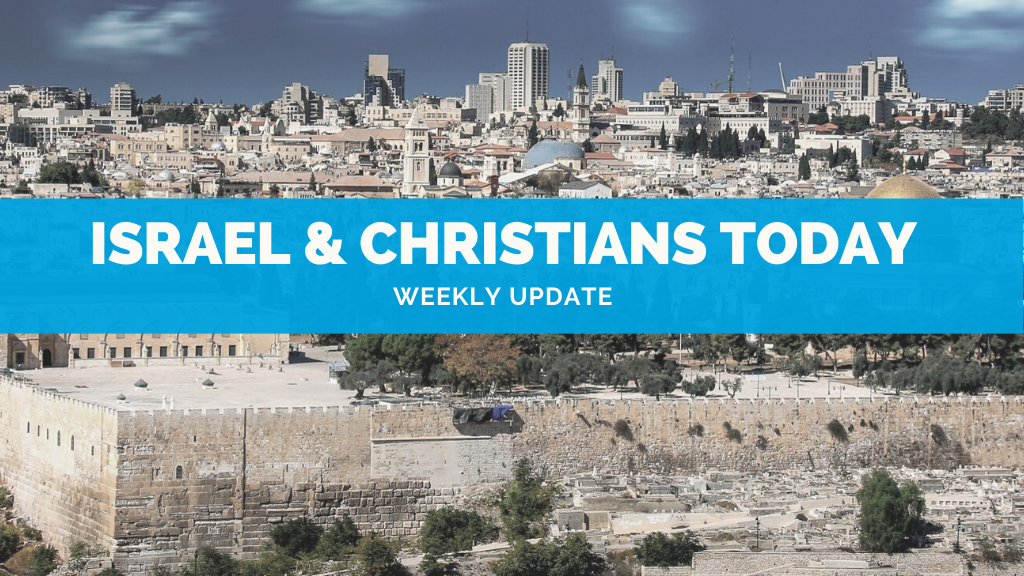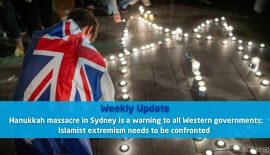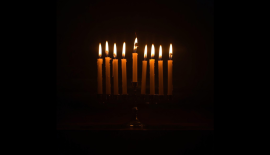Weekly Update: Two states for two peoples?
The “two state” paradigm is built on the assumption that there are two ethnic groups in “Palestine”: the Jews (most of whom came from Europe after the Holocaust), and “Palestinians” (the “indigenous” people of Palestine). The Palestinians were there first, the Jews came later. The “Palestinians” are Arabs, some of them are Muslim and some Christian. The idea of the “two state solution” is to allow the Jews to have their state (within borders determined by the international community), and the Palestinians should have their own state. The EU strongly supports the creation of a Palestinian State.
This paradigm is a distortion of history. The reality is that – like many other parts of the Middle East – many different groups and peoples have lived in Israel in changing constellations over the millennia. The Jewish people were living in the region known to the Romans as Judea long before Christianity or Islam existed. For centuries many more different ethnic and national groups settled in the region that came to be known as Palestine after Emperor Hadrian tried to ethnically cleanse the area of Jews in the second century CE.
The non-Jewish population of Israel is extremely diverse. Take the Arameans – an ancient Semitic speaking people with its origins in the central regions of modern Syria. The Arameans spread through the Middle East, and their own language developed (Jesus spoke a form of Aramaic). The Arameans were converted to Christianity from the first century CE. The Arab conquest in the 7th century resulted in the Islamization and gradual Arabization of Aramean communities throughout the Near East, ultimately resulting in their fragmentation.
Of the 170,000 Christians in Israel, about 12,000 belong to the Aramean community. However, many other Christians in Israel have the same Aramean background and also suffered from the Islam in the past centuries. In 2014 Israel recognized the Aramean community as an ethnicity separate from the Israeli Arabs.
One of the Aramean Christian leaders is Shadi Khalloul, who comes from a lineage that has its roots in the village of Baram, an entirely Aramaic-Maronite village near the present-day border with Lebanon. The village was destroyed after the 1948 war, and the refugees were dispersed and partly ended up in Tish, an Arab village not far from their original village. You can read his story below.
In God’s loving plan of redemption, restored Israel is a blessing to all peoples.
The Editorial team
Israel & Christians Today
Shadi Khalloul – an Aramean in Israel
Roger van Oordt writes: “Last June, I attended the commemoration in Enschede (in the east of Holland) of the mass murder of 580,000 Aramean Christians in the Ottoman Empire in 1915. Enschede is home to many Aramean (Syriac) Christians who fled the violence directed against them in the 1970s and 1980s.”
> Read more..
The Changing Identity of Israel’s Arabic-Speaking Christians
Amit Barak, co-founder of the Jerusalemite Initiative, spoke to participants in a January 25 Middle East Forum webinar about historic change occurring among the roughly 175,000 Arabic-speaking Israeli Christians and their growing identification with and integration into Israeli society as a whole.
> Read more..
Christians in Jerusalem fear persecution if a “State of Palestine” is created
The Jerusalemite Initiative wrote in a submission in 2020 to the International Criminal Court: “There are currently over 12,000 Christian Arabs living in Jerusalem.They enjoy full religious freedom to worship and practise their faith, guaranteed under Israeli law…. By contrast, the situation of Christians in areas ruled by Palestinians is far more precarious. The Christian communities there have shrunk significantly in recent years. The Palestinian Christian population stood at an estimated 15%, fifty years ago, but today it has dropped to 1.5%. Bethlehem was once a majority Christian city, although today it is barely a fifth Christian. In Gaza, the tiny Christian community, numbering only 3,000 people, has faced murder, violence and intimidation. Christians in the West Bank and Gaza Strip face harassment, discrimination and abuse, as described in a recent report. Opinion polls demonstrate that large percentages of Arab residents of Jerusalem, Christian and Muslim alike, would prefer to remain under Israeli control, as opposed to being transferred to PA jurisdiction. Subjecting them to PA jurisdiction would not be likely to respect their right to self-determination. Jerusalem’s Arab residents would face severe human rights violations under PA jurisdiction.“
> Read more..
Palestinians: Why Biden’s Aid Will Not Bring Peace
Khaled Abu Toemeh writes in Gatestone: “As the Biden administration steps up its efforts to bolster the Palestinian Authority (PA), Palestinians seem to be increasingly losing faith in their leaders. The Palestinian public also appears to be losing faith in any peace process with Israel. Many are even saying that they support the annulment of the Oslo Accords, signed in 1993 between Israel and the PLO and that the only peace process they would support is one that leads to the elimination of Israel.”
> Read more..
After Abbas: Palestinian political turmoil on the horizon
Lt. Col. (Res) Maurice Hirsch writes: “Mahmoud Abbas, the leader of both the PLO and Fatah, is almost 86 and is in the 17th year of his first four-year term as PA chairman. When he goes, Fatah will be divided, and the continued role of the PLO will be unclear.”
> Read more..
Afghanistan’s lessons for Israel
Jeremiah Rozman writes: “The U.S. withdrawal tells the world’s dictators and terrorists that America is no longer interested in its post-World War II role as the military guarantor of freedom.”
> Read more..
The Taliban’s Palestinian partners: Implications for the Middle East peace process
Dan Diker and Abu Khaled Toemeh write: “The U.S. withdrawal from Afghanistan and the resurgence of Islamism there poses a serious problem for the negotiation-based approach of the Fatah-ruled Palestinian Authority.”
> Read more..
Scripture for the week:
19 In that day there will be an altar to the Lord in the heart of Egypt, and a monument to the Lord at its border. 20 It will be a sign and witness to the Lord Almighty in the land of Egypt. When they cry out to the Lord because of their oppressors, he will send them a savior and defender, and he will rescue them. 21 So the Lord will make himself known to the Egyptians, and in that day they will acknowledge the Lord. They will worship with sacrifices and grain offerings; they will make vows to the Lord and keep them. 22 The Lord will strike Egypt with a plague; he will strike them and heal them. They will turn to the Lord, and he will respond to their pleas and heal them.
23 In that day there will be a highway from Egypt to Assyria. The Assyrians will go to Egypt and the Egyptians to Assyria. The Egyptians and Assyrians will worship together. 24 In that day Israel will be the third, along with Egypt and Assyria, a blessing on the earth. 25 The Lord Almighty will bless them, saying, “Blessed be Egypt my people, Assyria my handiwork, and Israel my inheritance.”




